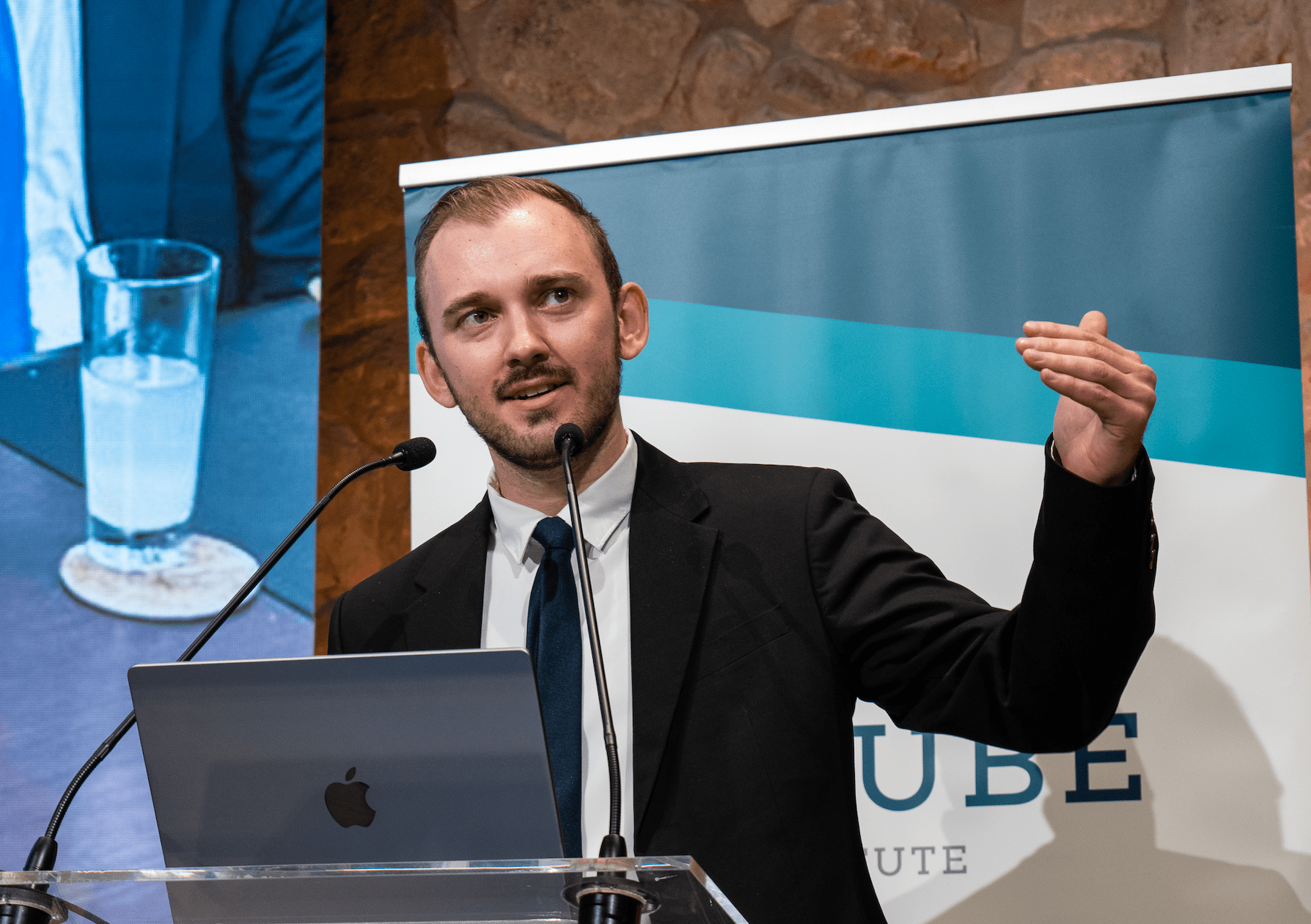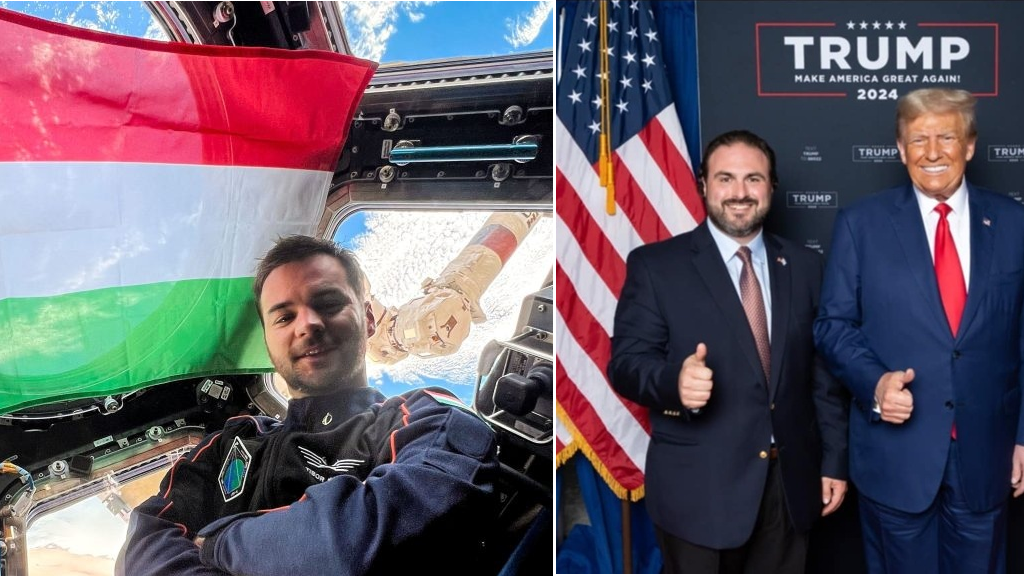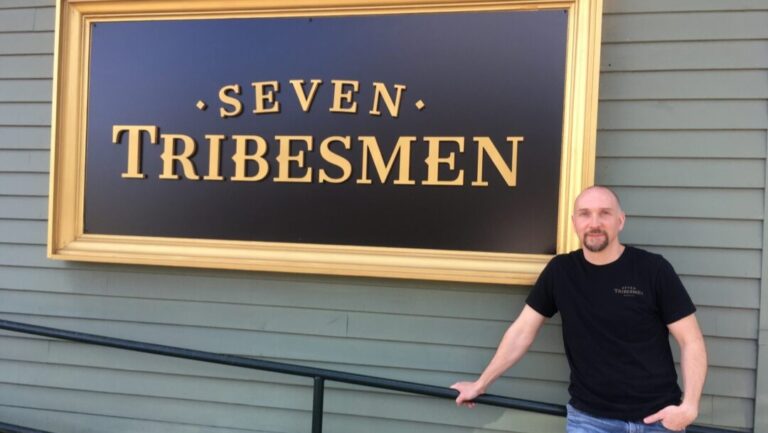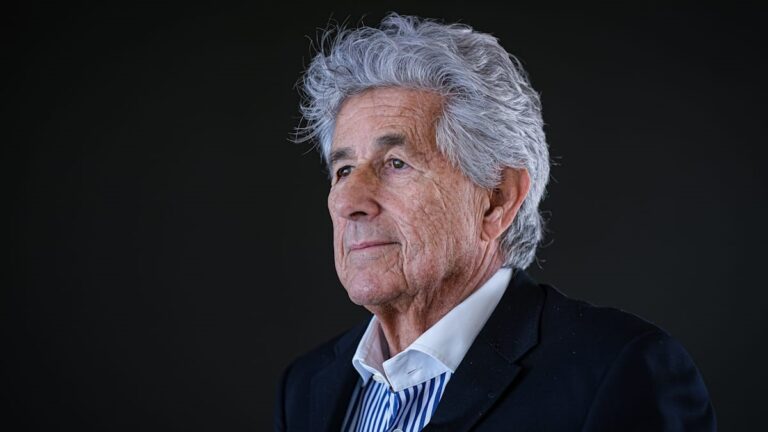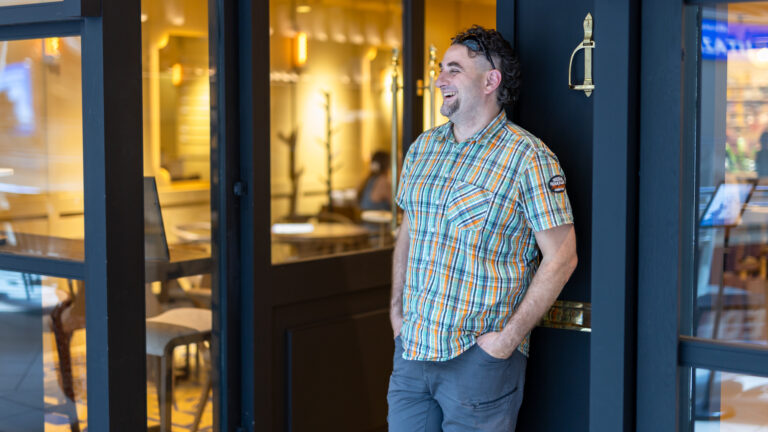Hananya Naftali is a leading Israeli Jewish influencer and human rights activist in the fight against antisemitism and terrorism against Israel. Naftali completed his degree in political science at the Open University in Tel Aviv. He served in the Israeli army as a combat medic. During his service he fought in the 2014 Gaza War and has also treated Syrian civilians injured in the Syrian civil war. Today it is his mission to defend Israel in the international arena. Since 2018, Naftali has been working with the former and currently Prime Minister-designate Benjamin Netanyahu as part of his digital team.
Hananya Naftali visited Hungary at the invitation of the Danube Institue.
How did you become an influencer and activist defending Israel and human rights in the Middle East?
Growing up in Israel, I was raised to love my country. It’s very similar to how most Hungarians were raised; I think we’re both patriotic nations. Seeing how my country is being attacked and slandered causes pain in my heart. Right after I finished the advanced eight-month training of the Israeli Defence Forces, I had my 19-year-old birthday. So as the 2014 Gaza war began, I started my three years serving in the IDF at the time of the Protective Edge operation. I found myself celebrating my birthday with the tank crew, and then we had to enter the Gaza Strip. Our main focus was on defending Israel, our mission was to hit the Hamas infrastructure. For the readers, Hamas is a terror organization that states in its 1988 charter that they want to annihilate Israel and build an Islamic country in its place. So, frankly, they’re not very happy with us existing. In the summer of 2014—we have this saying in Hebrew ‘every summer we have a war’—before we entered the Gaza Strip, we gathered late at night and our commanders told us very strictly that our mission was to defend Israel, and we were forbidden to harm Palestinian civilians, as our sole mission was to hit terrorists. I believe we successfully did it. We had to fight for one week inside the Gaza Strip, and then we had to come back out to replenish, relax, take a shower—because when you’re in the field you don’t shower—and then I got my phone back and called my parents as they were worried about me. When I checked the news on my phone saw that in London and Berlin,
people were protesting against Israel with Palestinian flags, calling us, including me, a criminal.
I didn’t like this because I knew these claims were false, and then I decided that I would like to fight back against these claims and tell the truth. So, once I finished serving in the Army, I decided that I’m going to learn English and how to edit videos because I wanted outsiders to know what it’s like to be an Israeli. So that’s how I started making videos. My first video was about my experience as an Israeli soldier and the reason why it went viral was because people in Europe were not used to this kind of perspective anywhere in the media. By the way, at the beginning, I was very shy, and I didn’t like attention, but my love for the country and serving in the army made me forget about it, as when you join the army, there is no room for being shy because it could cost you your life. As I gained more attention, I started making videos every week. Now, besides working with Benjamin Netanjahu’s media team, I still make videos every week about my country, fighting for the truth. Some of these videos are political, and some are travel videos to keep the balance.
How did you get involved in working with Israeli Prime Minister Benjamin Netanyahu’s media team?
In 2017, when I had around a few hundred thousand followers, I wanted to do an interview with Netanjahu to learn from him how to defend Israel, and how to tell the truth about Israel, because he was the ambassador to the UN and our Prime Minister. It was a big dream. We usually say in Hebrew that if you have a dream, you dare, and you get it done, so I somehow got the contact of his advisor from the military spokesperson, and I messaged him literally on Facebook, telling them I wanted to do an interview with Netanyahu. After a few hours they answer me saying: ‘it’s interesting because we were just having a meeting about you, we wanted to invite you to do a video interview with him.’ So, it was a perfect match. A few months later, I did this interview with him. When I asked him how to defend Israel, he gave me a very simple answer: ‘Just tell the truth; we don’t need to lie, we don’t need to distort facts.’
I believe Hungary is suffering from the same problem
that there is a distortion of facts regarding Mr Orbán and the country of Hungary. Long story short, a few months after the interview they offered me the job to join Prime Minister Netanyahu’s team.
Now that Benjamin Netanyahu won the recent elections, what changes do you think will happen in Israel, and why do you think he is the right leader of the country?
I think I can truly say why he is a right leader for Israel as I have been in Netanyahu’s inner circle for nearly five years, and I saw what cameras don’t see. I saw what is happening behind closed doors and then you can see that he’s not acting. Netanyahu doesn’t care about saying the right thing but doing the right thing. I believe I saw that he’s the right person to save Israel against so many threats, like the Iranian regime. It’s important to know that our neighbours want to destroy us. So, when you have neighbours who want to destroy you, and they don’t just talk about it, but take action to destroy your country, you need strong leaders. I think that Netanyahu is highly regarded in the international arena, and he knows what he’s doing. I believe that nowadays you need leaders with experience, leaders who know what they’re doing. I think that this is what Mr Orbán and Mr Netanyahu have in common: both of them have this understanding that they want to do the right thing and they are doing it.
They don’t care what the mainstream media will say about them.
They don’t care about the people who hate them; they care about their nation, and want their nation to wake up to a better morning.
You mentioned that you served in the army during the 2014 Gaza War. In Israel, after you turn 18, it’s compulsory to serve in the IDF. For us living in Western countries, serving in the military is not a common experience. How did it change you and perhaps your perspective on the value of life?
When you join the army, you meet people coming from all parts of the country, so, it’s the army of all the people. When you join, you can tell the commanders what you would like to do, and they try to meet your needs and wishes, but the three years of service is not really about your wishes. At the end of the day, you understand that you’re giving three years of your life to serve your country. Also, you’re sleeping in the same room with soldiers you never knew before, but you become friends for life. I think it’s really amazing how you can create friendships that can never be made in any school, university or with neighbours. You’re literally with people that you know will be in battle with you, and if needed, they will take a bullet for you, and you will take the bullet for them.
Israeli society is based on these principles of loving and defending your country.
So, growing up in Israel, I was looking forward to my time in the army. It’s not something that I wanted to escape from. So, it’s something in the Israeli society that maybe European societies cannot understand. But again, it’s because you wake up to a reality where a terror attack can occur at any moment just outside your home. So, you are in this reality in which you understand that no one will defend you if you don’t do something. If Israel will not stand for Israel, who will stand for Israel? However, I do have an interesting story from the army. First, I served in the tank crew, but then I wanted to become a combat medic, so I asked to go to the Medical Military Academy, and I did the course to became a combat medic. When I finished it, I had to take an oath in which we had to promise that we will treat everyone, even our enemy. We were stationed as combat medics on the northern border of Israel, right next to Syria.
Almost every night, we would pick up injured civilians from the civil war in Syria, which is an enemy state of Israel.
We would go to the border where someone from the other side would bring the injured civilians, and we would take them, treat them to save their lives and bring them into our Israeli hospitals where they could stay as long as they needed and then we would take them back to Syria. Even though we didn’t speak their language, we saw how grateful they were, and they all said thank you. It was one of my best experiences: that I was able to show my neighbours that I don’t hate them, and I want to peace with them. Maybe for many decades, they had been taught and brainwashed about how Israel is their enemy, but then in the war, when they needed help, they probably never imagined that their enemy, Israel would come to their rescue and save their lives. It is a biblical principle to love your neighbour, and we practice it. However, these are the kinds of stories that the mainstream media fails to tell. Israel is not a war zone, but we do fight radicals, we do fight terrorists and we do distinguish between those who are our enemies and those who are not.
After you finished serving in the Army, you started to defend Israel in another way by making YouTube videos to tell the truth and destroy the lies about the Jewish nation. Several videos went viral about topics that are rarely covered on any mainstream media platforms. One of these topics is about how the United Nations is biased towards Israel, condemning it more often than any authoritarian regime. You recently made a video about how the UN, instead of sanctioning or censoring Iran, allowed the Iranian President to speak for half an hour at the General Assembly. Why do you think the UN is using a double standard when it comes to condemning Israel?
First of all, it was shameful that they gave the floor to the president of Iran to speak, and granted him freedom of speech, while he negates freedom of speech from his own people. While he, as the Supreme Leader of Iran can be on Twitter and has freedom of speech given to him by Western companies, he bans his own people from going on Twitter. If the Iranian people want to go on Twitter, they need to use VPN services, and whenever there is a protest, the regime shuts down the internet, so we will not see what’s happening in Iran. On top of that, I want to highlight how shameful it is that to this day, as we speak, Iran is sitting on the UN’s Women’s Rights Committee. While they are given the platform to discuss women’s rights, in their country, they kill women who want to be free to choose whether they want to put on a headscarf or not. It’s just insane to me. These double standards show the fact that the UN is no longer fighting for justice, but it’s rather fighting for interests. I think the UN was based on the good principles of preventing wars, fighting for justice, social justice and human rights. However, I think they lost their conscience. As soon as interests started to dominate, they stopped serving justice and began to serve interests. The bigger the donor, the louder their voice will be.
I believe both Israel and Hungary are suffering from these double standards.
While the UN would gladly bash Israel and Hungary because they know that we are civilized and we are not going to give them bad or harmful reactions, they’re turning a blind eye to what’s happening in Iran, Venezuela, Syria and North Korea. I recently looked at statistics, and it showed that in 2021, the UN passed 14 resolutions against Israel versus two and one against Syria and North Korea respectively. To portray Israel as worse than North Korea is outrageous. Israel is a blessing to the world. We have more start-ups than any other country, and if you really want to boycott Israel, you probably need to live in a cave because there is Israeli technology everywhere. So, both of our countries are suffering from these double standards. Perhaps we need to give thanks to the mainstream media and the UN and other biased international forums because they brought us, Israelis and Hungarians, closer together.
You did a video recently where you reacted to the threats you’re getting because of your work and opinions. How do you deal with it and could it be a security issue in the future? Also, have you been cancelled because of your opinion?
I think that when you’re conservative, you’re immediately cancelled. So, I have nothing to be afraid of, as I was already cancelled many years ago. I’m travelling the world, speaking and sharing the truth about Israel. I think that the truth of Israel is the truth of conservatism. Now they are targeting Israel, but next, they go after Hungary and then they’ll go after other minorities. That is why it’s so vital for us to unite and to be a strong voice, because our strength is in our unity. As I travel a lot, I get death threats; people have threatened to slaughter me, they told me that if they meet me, they will slit my throat, and they will cut my head off. However, it only shows what their values are. If you disagree with me, and therefore you want to cut my head off, that shows a lot about you and how you are unable to have a civilized debate.
I’m not scared of threats because I believe I am doing the right thing.
Also, I do believe that God protects me. On my recent trip to Canada, several people advised me not to share my location in real-time for my safety because at that time the Islamic regime in Iran made a statement that they want to take revenge on Israelis, so my hosts feared that they might do something to me. Thankfully, these things don’t concern me. What concerns me more is to make more people care about the important issues, because I think that most people don’t have an opinion or just don’t care.
In May 2021, there was a violent clash between the Palestine territories and Israel. The mainstream media largely supported by the Palestinian side of the conflict and celebrities like Bella Hadid and others posted anti-Zionist propaganda on their social media platforms. These anti-Zionist sentiments often led to violent Palestinian solidarity rallies that ended up in anti-Semitic attacks against Jewish people in the US and Europe. These attacks showed that anti-Zionism might be the new form of anti-Semitism. Do you agree with this statement, and when can we separate it from legitimate criticism of certain Jewish politics?
Let me begin by saying that criticizing Israel is welcome. You don’t have to agree with Israeli policies as we’re a democracy, and we don’t have to agree on everything. Also, it’s important to have debates. However, the minute you question Israel’s right to exist, that is a problem, and for most anti-Zionist people, that’s on their agenda. Let me explain briefly what Zionism is. In one sentence, it basically means that Jews have the right to exist in their ancestral homeland, return to Israel and thrive there. Our nation was expelled from Israel during ancient times, and we’re one of the few nations that were able to retrieve our land. So, the anti-Zionists say that Jews don’t have the right to exist in Israel; being an anti-Zionist means that you’re oppose the right of the Jews to exist in Israel. It’s just like saying that Hungarians don’t have the right to exist in Hungary, which would also make Hungarians angry. However, they go in even further.
They’re trying to be politically correct, so they say, ‘We love the Jews, we just don’t like Israel.’
You can’t love the Jews and hate Israel, the only Jewish country in the world, as you can’t love Israel and hate the Jews. It comes together. It’s the same as saying, ‘I hate Hungarians, but I love Hungary’. It doesn’t go together. It only shows how hypocritical they are, and this political correctness set the trap before their own foot because anti-Zionism is anti-Semitism. As I mentioned, it’s okay to criticize Israel, it’s it is welcome and you don’t have to agree with the Israeli policies at all, but to criticize the Jewish right to exist or of self-defense is anti-Semitism.
In recent months, the mainstream media has been reporting extensively on Kanye West’s controversial anti-Semitic statements. Celebrities and influencers shared their outrage about the statements, and many stated on their social media platforms that they support the Jewish community. While it’s great that people don’t tolerate when a celebrity makes anti-Semitic statements, when it comes to more serious anti-Semitic attacks, those don’t get this much coverage and attention. Do you think this case was more about cancelling Kanye than supporting the Jewish community?
I think that the story with Kanye is complicated. Several people within the conservative community defended him and thought that he was under attack because he is conservative, while others said things like ‘we need to forgive him because he suffers from mental-illness,’ and so forth. However, I think that you cannot tolerate such things, there has to be red line. Complaining about how the Jews control the media and the economy is crossing that red line. Jews make up 0.2 per cent of the population in the United States and yet, according to an FBI report,
in 2020 60 per cent of the hate crimes in the United States of America were committed against Jews.
So, you ask yourself, if Jews are such a small minority in the United States, why are most hate crimes committed against them? I think this is a very dangerous trend because this is exactly what the Nazis said before the Crystal Night and all the pogroms against the Jews. It started with their complaining about how Jews control their businesses and the media. I think that this is very wrong, because you can be Jewish and Hungarian, you can be Jewish and American. Usually, Jews are well known for being loyal to their countries and being patriots. So, we want to make sure that there is freedom of speech, but there is a red line between freedom of speech and inciting against a group. However, I think many people saw this as an opportunity for virtue signalling, saying how much they supported the Jews. When for example Bella Hadid commented in reaction to the Kanye controversy that ‘she is with her Jewish brothers and sisters’, I didn’t believe it was honest for one second, because time and time again she’s bashing Israel, too, even though she never visited our country. I don’t hate these influencers who criticize the existence of Israel, I just want to welcome them to come to Israel and see for themselves the reality, how Jews and Muslims sit down with each other for dinner, for coffee. If you just walk along the Jaffa Street in Jerusalem, in five minutes these lies will be shattered. I have to add with regard to anti-Semitism that
I think it’s beautiful that Hungary is one of the safest countries in the world for Jewish people.
I feel at home here, I feel very safe to be a Jew while travelling in Hungary. I hear Hebrew here; I see Jewish people wearing kippahs, and they are not looking behind them to see if someone will hit them. I think that one of the reasons for that is because Mr Orbán understands that the Holocaust didn’t start with the gas chambers, it started with words of hate. That’s why he promotes the policy of zero tolerance towards anti-Semitism. That’s not against the freedom of speech; it is against hate speech. I think we all should keep in mind that usually those who’re attacking Jews are people who never met a Jew in their life or had a discussion with a Jew. I would be glad to sit with people that hate me and try to help them understand who my people are. We’re just like the Hungarian nation, we’re just like any other nation, we want to wake up in the morning, drink coffee, go to work and come back home to our families without being stabbed or attacked because of our identity.
Another topic often covered in your videos, and not really covered elsewhere, is the coexistence of Muslims, Palestinians, Jews, and Christians. In your recent video at the Ben Gurion Airport, you showed that there are both Muslim and Jewish prayer rooms at the airport. Do you think that peaceful coexistence could be a resolution to the Palestinian-Israeli conflict, if there’s any?
I think that Israel wants to live in peaceful coexistence. Historically, Israel has offered the Palestinians peace many times; the only answer we got was no. In one of those offers, Prime Minister Ehud Barak and Ehud Olmert offered almost half of Israel to the Palestinians, all of Judea and Samaria, known as the West Bank, and yet they said no. I think that it is very clear why they say no. It’s because they don’t want to live next to Israel; they want to live on top of Israel. They don’t want to be our neighbours. Many of their leaders say that they want to throw the Jews into the Mediterranean Sea. Hamas said that they want to see the Mediterranean Sea turn red with the blood of Jews.
They don’t want peace with Israel, they want peace without Israel.
Frankly, we want to exist. I think that the solution is education. It’s unthinkable that Palestinian kids when they go to school, they are taught that Israel does not exist; that they are incited to hate the Jews, their neighbours. When I went to school, I learned that my neighbours were here to stay, and I needed to learn how to live with them, whether I liked it or not. So, I think that the conflict needs more education on both sides. Also, the Palestinian leadership needs to change. The Palestinian president Mahmoud Abbas last year entered his 16th year in power, which shows that there is no democracy there. He has no problem flying to the UN in New York City and speak about how much he wants peace but then refuses to actually drive 20 minutes to Ramallah, to negotiate peace. It shows his true colours: he benefits from the conflict as he gets billions of dollars through the EU. When Trump was the President of the US, he stopped funding them. So, Abbas is in the business of whining about how poor the Palestinian people are but forgets to mention that they’re poor because of the corruption of their leaders. They don’t care about their people. Israel cares about the Palestinian people more than they do. We provide more than 100,000 jobs for Palestinians. So, if it’s really so bad, why are the Palestinians coming to Israel when they need a job or a cure for their sickness? Israeli hospitals are filled with Palestinians. I have to say, it’s easy to criticize Israel because Israel is now no longer the underdog, it’s a strong country. However,
the mainstream media wants us to apologize for being strong.
One thing we’ve learned from history is that when people threaten to destroy us, we believe them, we believe what they’re saying, and we’re going to do anything in our power to prevent them from doing it.
Danube Institute launched a project titled ‘Attacks on Christian Communities and Institutions’ at the beginning of this year, in which we’re planning to do fieldwork in six countries from the Middle East to Africa and Europe. One of our fieldwork trips is going to be in Jerusalem, Jordan and the Palestinian territories. As a Christian believer yourself, what is your experience living in Israel? Is it any different from the situation of Christians in the Palestinian territories?
First of all, I define myself as a Jew who follows Jesus. I have to say that there is pluralism in Israel and freedom of worship for all religions. I was working for the government in 2018 until we started this round of cycle of elections. To tell you that I did not face rejection would be a lie, but it’s a minority that does not represent the majority. There are people who think that Israel should look one way, but thankfully they aren’t a majority. I think that there is radicalism everywhere, and we need to ensure that this radicalism remains marginal. You can’t always control what people think. Obviously, you don’t want to control what people think because in a democratic country you allow people to express their opinions as long as it’s not hate speech. Overall, in Israel, whether you’re Muslim, Christian, Jewish, Bahai, Druze or Turkish, you can live according to your cultures, your traditions, and there is room for that in Israel. The greatest example is that Arab, Muslim and Christian members of the Israeli parliament, the Knesset.
Our minorities are well represented, and thankfully it’s not something that is of concern to the Israeli public.
When you look at the Christians in the Palestinian Authority, you need to look at the numbers. Bethlehem used to be predominantly Christian; more than 80 per cent of the city was Christian. Now, they are, I think, less than 30 per cent. I think that Christians in the Palestinian Authority are mainly kept as puppets, so that they can use them to show that they are pluralistic. I don’t think that they have full freedom. I have seen several videos of churches within the Palestinian Territories that were under attack and priests who had to run for their lives. I wouldn’t say that it’s an everyday reality, but I think that the Palestinian leaders have radical minds: they think that you either join them, or you don’t have the right to exist. I think that the numbers show that most of the Christians in Bethlehem have left Bethlehem. They did not feel it was a safe place for them. I think that it’s really sad because Bethlehem is the place where Jesus was born, and it’s really sad that Christians have to escape from the birthplace of their Saviour.
You visited Hungary many times, what is your experience of the country, and how do you evaluate the Hungarian government’s efforts to support the state of Israel? Also, how is Hungary perceived today by Israeli Jews?
If you go to Israel and say that you’re from Hungary, most Israelis will smile at you, hug you and shake your hand. We perceive Hungary as a very close ally. As far as I’m concerned, I see Hungary as my family. I feel very much at home here and welcome, and I think that it’s more than just the values and the interests that we share, it’s a common destiny. So, I think that
now there’s this golden era for Israel in Hungary, and there is no better time than now to improve and build partnership.
Israelis would be delighted to see a Hungarian Embassy in Jerusalem. It’s something that would touch the hearts and minds of Israelis. Hungary has been standing on the right side of history with the Jewish people and with Israel, voting with Israel, and it’s something that is not going under the radar for us. We see this, and we greatly admire the leadership in Hungary, because we see how the left media also in Israel attacks Mr Orbán and portrays him as a dictator, and to me it’s funny considering the fact that they do the same to Benjamin Netanyahu. The liberals have hijacked freedom of speech, they say, ‘if you don’t think like me, then you don’t have the right to express yourself.’ Even in Israel, we see how great Mr Orbán is. So, if even in Israel we see how great Mr Orbán is for Hungary, and how the light of Hungary shines in Europe, one cannot be indifferent to this. So,
I have nothing but admiration for the prime minister of Hungary.
I think he has great passion and love for the Hungarian nation, which is why he refuses to make concessions and wants to protect the borders. Surely, no country is perfect, and no leader is perfect, but I think that you need to look at the positive actions and results. The results show that Orbán knows how to run the country and just like Mr Netanyahu, he knows how to deliver results. To give you an example about Netanyahu: under his last presidency, we made four peace agreements with Arab countries. Especially now, in this tough season of world crises, the post-COVID times and the war between Russia and Ukraine, we need strong leaders like them.

